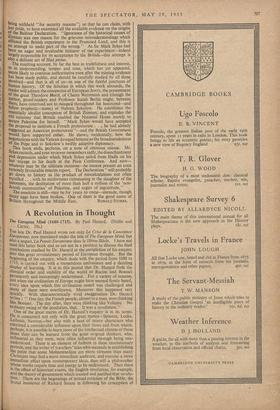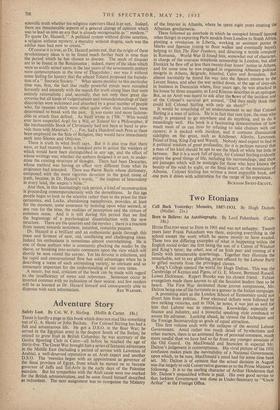A Revolution in Thought
The European Mind (1680-1715). By Paul Hazard. (Hollis and Carter. 35s.)
THE late Dr. Paul Hazard wrote not only La Crise de la Conscience Europeenne, now translated under the title of The European Mind, but also a sequel, La Pens& Europeenne dons la 18etne Siècle. I have not read this latter book and so am not in a position to discuss the final conclusions reached by Dr. Hazard at the completion of his enquiry into this great revolutionary period of European thought. But the beginning of the enquiry, which deals with the period from 1680 to 1715, is carried out with a tremendous enthusiasm and a dazzling display of learning. It is in this period that Dr. Hazard finds the classical order and stability of the world of Racine and Bossuet Petsistently and increasingly undermined. For a variety of reasons, Just when the civilisation of Europe might have seemed firmly based, every idea upon which this civilisation rested was challenged and Many of them were overthrown. Moreover this happened very quickly. With characteristically vivid exaggeration Dr. Hazard Writes. " One day, the French people, almost to a man, were thinking like Bossuet. The day after, they were thinking like Voltaire. No Ordinary swing of the pendulum, that. It was a revolution." _ One of the great merits of Dr. Hazard's enquiry is in its scope. He is concerned not only with the great names—Spinoza, Locke, Leibnitz, Newton—but also with a host of minor characters who exercised a considerable influence upon their times and from whom, Perhaps, it is possible to learn more of the intellectual climate of those times than can be learned from the great original thinkers, who, influential as they were, were often influential through being mis- understood. There is an element of fashion in these revolutionary Periods, and the writer of travellers'iales who succeeds in establishing the point that some Mohammedans are more virtuous than many Christians may find a more immediate audience, and exercise a more immediate effect upon contemporary ideas, than will a philosopher whose works require time and energy to be understood. Then there is the effect of historical events, the English revolution, for example, and the theory of government which created and justified/that revolu- tion. There are the beginnings of textual criticism of the Bible, the brutal insistence of Richard Simon in following his conception of scientific truth whether his religious superiors liked it or not. Indeed, there are innumerable aspects of a general change of opinion which was to lead us into an era that is already recognisable as" modern." To quote Dr. Hazard, " A political system without divine sanction, a religion without mystery, a morality without dogma, such was the edifice man had now to create."
Of course it is true, as Dr. Hazard points out, that the origin of these revolutionary ideas is tp be found much further back in time than the period which he has chosen to discuss. The seeds of disquiet are to be found in the Renaissance ; indeed, many of the ideas which were so avidly seized upon in the last years of the seventeenth century were commonplaces in the time of Thwydides ; nor was it without some feeling for history that the atheist Toland proposed the founda- tion of a" Socratic Society." What seems peculiar to this particular time was, first, the fact that really powerful minds were occupied fervently and sincerely with the search for truth along lines that were entirely rationalistic ; and, secondly, that not only their great dis- coveries but all kinds of vulgarisations and misunderstandings of their discoveries were welcomed and absorbed by a great number of people who, for reasons which were often quite other than rational, were determined to break with the past. It was easier and more fashion- able to attack than defend. As Swift wrote in 1708, " Who would ever have suspected Argil for a Wit, or Toland for a Philosopher, if the inexhaustible Stock of Christianity had not been at hand to pro- vide them with Materials ? ... For, had a Hundred such Pens as these been employed on the Side of Religion, they would have immediately sunk into Silence and Oblivion."
There is truth in what Swift says. But it is also true that there were, or had recently been, a hundred pens in action the wielders of which would have been distinguished in any age, and the effect of whose writings was, whether the authors designed it or not, to under- mine the existing structure of thought. There had been Descartes, whose method was having an effect very different from what its originator had intended. There was Pierre Bayle whose dictionary, composed with the most rigorous devotion to the great cause of truth, became, in Dr. Hazard's words, " the inspirer of heterodoxy in every land, the sceptic's bible."
And then, in this fascinatingly rich period, a kind of reconstruction is proceeding contemporaneously with the demolitions. In this age people begin to look to the scientist rather than to the priest for their certainties, and Locke, abandoning metaphysics, provides, at least for the moment, some assurance by insisting upon what seemed, at any rate for the time, the realities of perception and the virtues of common sense, And it is still during this period that we find the beginnings of a psychological dissatisfaction with the new structure. There are the quietists and the mystics ; there is a reaction from reason towards sentiment, intuition, romantic passion.
Dr. Hazard is a brilliant and an enthusiastic guide through this maze and ferment of new, old, conflicting and challenging ideas. Indeed his enthusiasm is sometimes almost overwhelming. He is one of those authors who is constantly plucking the reader by the sleeve, or breaking into ecstatic comments upon the view which will shortly be seen round the corner. Yet his fervour is infectious, and his rapid and conversational flow has solid advantages when he is describing a scene of such astonishing variety, so intricate and so immensely important for the understanding of our own times.
' A minor, but real, criticism of the book can be made with regard to the insufficiency of notes and references. _Sentences occur in inverted commas with no indication of their source, and few readers will be as learned as Dr. Hazard himself and consequently able to



































 Previous page
Previous page